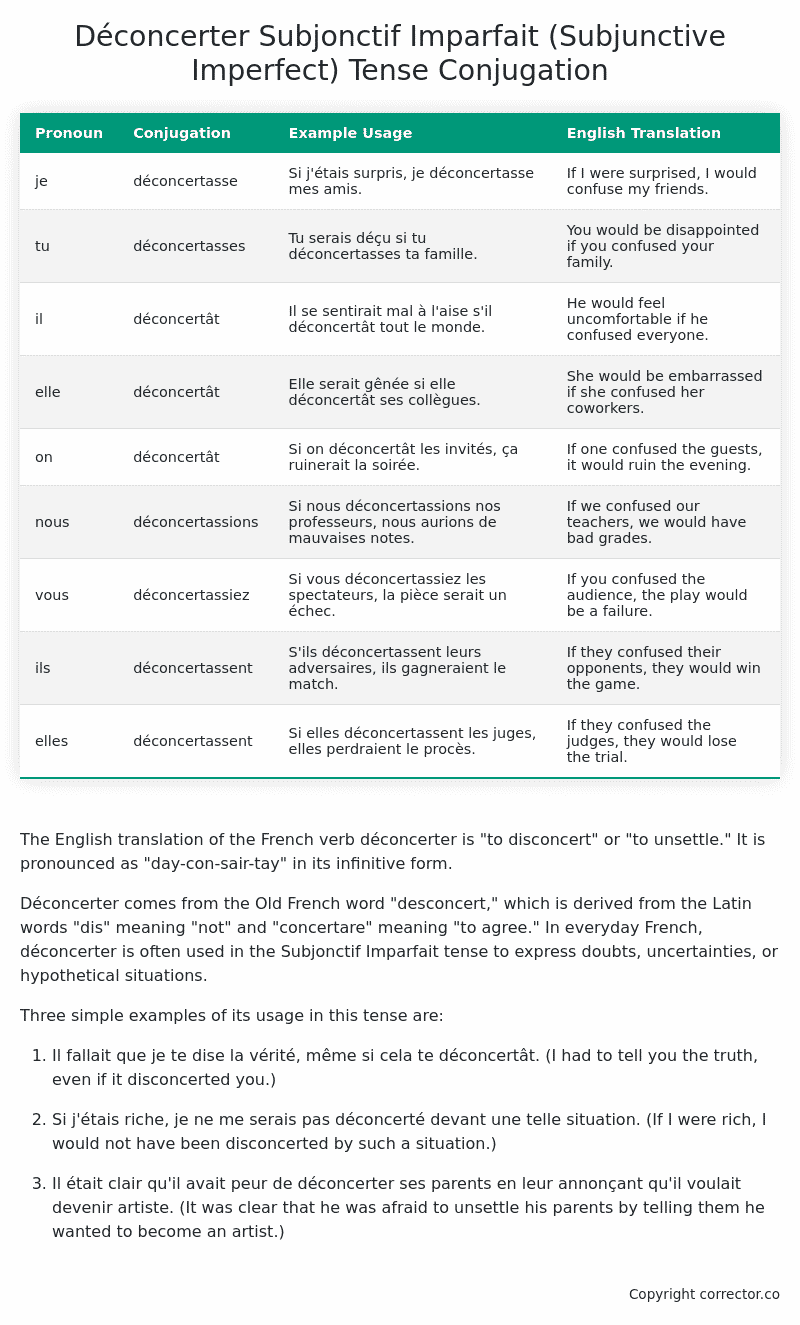Subjonctif Imparfait (Subjunctive Imperfect) Tense Conjugation of the French Verb déconcerter
Introduction to the verb déconcerter
The English translation of the French verb déconcerter is “to disconcert” or “to unsettle.” It is pronounced as “day-con-sair-tay” in its infinitive form.
Déconcerter comes from the Old French word “desconcert,” which is derived from the Latin words “dis” meaning “not” and “concertare” meaning “to agree.” In everyday French, déconcerter is often used in the Subjonctif Imparfait tense to express doubts, uncertainties, or hypothetical situations.
Three simple examples of its usage in this tense are:
-
Il fallait que je te dise la vérité, même si cela te déconcertât. (I had to tell you the truth, even if it disconcerted you.)
-
Si j’étais riche, je ne me serais pas déconcerté devant une telle situation. (If I were rich, I would not have been disconcerted by such a situation.)
-
Il était clair qu’il avait peur de déconcerter ses parents en leur annonçant qu’il voulait devenir artiste. (It was clear that he was afraid to unsettle his parents by telling them he wanted to become an artist.)
Table of the Subjonctif Imparfait (Subjunctive Imperfect) Tense Conjugation of déconcerter
| Pronoun | Conjugation | Example Usage | English Translation |
|---|---|---|---|
| je | déconcertasse | Si j’étais surpris, je déconcertasse mes amis. | If I were surprised, I would confuse my friends. |
| tu | déconcertasses | Tu serais déçu si tu déconcertasses ta famille. | You would be disappointed if you confused your family. |
| il | déconcertât | Il se sentirait mal à l’aise s’il déconcertât tout le monde. | He would feel uncomfortable if he confused everyone. |
| elle | déconcertât | Elle serait gênée si elle déconcertât ses collègues. | She would be embarrassed if she confused her coworkers. |
| on | déconcertât | Si on déconcertât les invités, ça ruinerait la soirée. | If one confused the guests, it would ruin the evening. |
| nous | déconcertassions | Si nous déconcertassions nos professeurs, nous aurions de mauvaises notes. | If we confused our teachers, we would have bad grades. |
| vous | déconcertassiez | Si vous déconcertassiez les spectateurs, la pièce serait un échec. | If you confused the audience, the play would be a failure. |
| ils | déconcertassent | S’ils déconcertassent leurs adversaires, ils gagneraient le match. | If they confused their opponents, they would win the game. |
| elles | déconcertassent | Si elles déconcertassent les juges, elles perdraient le procès. | If they confused the judges, they would lose the trial. |
Other Conjugations for Déconcerter.
Le Present (Present Tense) Conjugation of the French Verb déconcerter
Imparfait (Imperfect) Tense Conjugation of the French Verb déconcerter
Passé Simple (Simple Past) Tense Conjugation of the French Verb déconcerter
Passé Composé (Present Perfect) Tense Conjugation of the French Verb déconcerter
Futur Simple (Simple Future) Tense Conjugation of the French Verb déconcerter
Futur Proche (Near Future) Tense Conjugation of the French Verb déconcerter
Plus-que-parfait (Pluperfect) Tense Conjugation of the French Verb déconcerter
Passé Antérieur (Past Anterior) Tense Conjugation of the French Verb déconcerter
Futur Antérieur (Future Anterior) Tense Conjugation of the French Verb déconcerter
Subjonctif Présent (Subjunctive Present) Tense Conjugation of the French Verb déconcerter
Subjonctif Passé (Subjunctive Past) Tense Conjugation of the French Verb déconcerter
Subjonctif Imparfait (Subjunctive Imperfect) Tense Conjugation of the French Verb déconcerter (this article)
Conditionnel Présent (Conditional Present) Tense Conjugation of the French Verb déconcerter
Conditionnel Passé (Conditional Past) Tense Conjugation of the French Verb déconcerter
L’impératif Présent (Imperative Present) Tense Conjugation of the French Verb déconcerter
L’infinitif Présent (Infinitive Present) Tense Conjugation of the French Verb déconcerter
Struggling with French verbs or the language in general? Why not use our free French Grammar Checker – no registration required!
Get a FREE Download Study Sheet of this Conjugation 🔥
Simply right click the image below, click “save image” and get your free reference for the déconcerter Subjonctif Imparfait tense conjugation!

Déconcerter – About the French Subjonctif Imparfait (Subjunctive Imperfect) Tense
Formation
Common Everyday Usage Patterns
Interactions with Other Tenses
Subjonctif Présent
Indicatif Passé Composé
Conditional
Conditional Perfect
Summary
I hope you enjoyed this article on the verb déconcerter. Still in a learning mood? Check out another TOTALLY random French verb conjugation!


